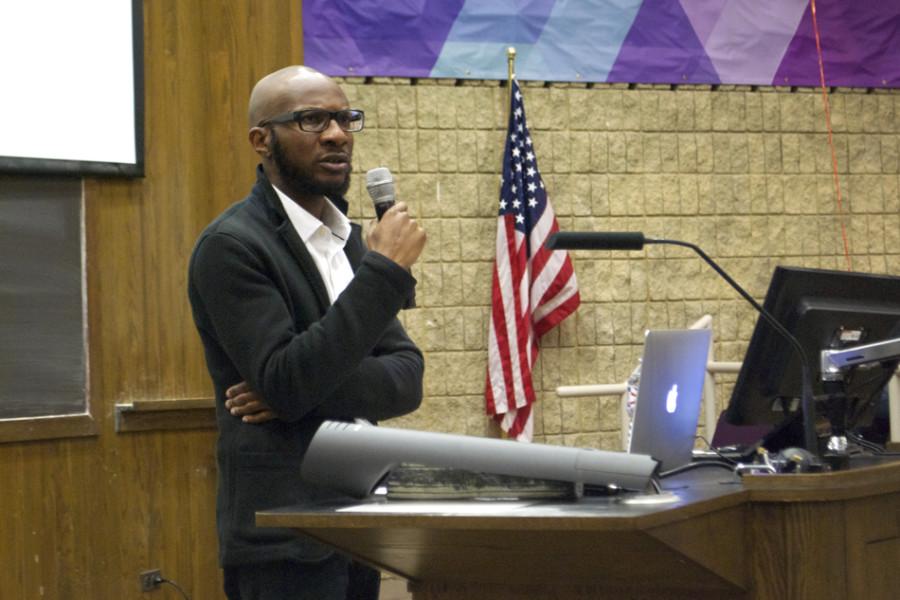Novelist Teju Cole discusses ‘white-savior industrial complex’ for packed audience
Julia Doran/The Daily Northwestern
Novelist Teju Cole discusses the “white-savior industrial complex” Thursday night. Cole, author of the novel “Open City,” said he was surprised so many people attended the event.
April 24, 2015
When novelist Teju Cole first heard about the KONY 2012 viral campaign, he immediately took to Twitter to express his disbelief about the “white savior” in a series of tweets.
These seven tweets garnered national attention and resulted in Cole writing a piece in The Atlantic called “The White-Savior Industrial Complex.”
At an event hosted by the Buffett Institute for Global Studies and other campus organizations, Cole spoke to a crowd of about 300 people in Leverone Hall about this concept. He said white people often try to show their charitability by volunteering for or giving money to programs that help people in other countries, especially in African countries like Nigeria, where Cole is from.
“People just try to generalize (the white-savior industrial complex), try to soften it a little bit, ‘let’s not bring race into it,’” said Cole, whose comment was met with laughter. “It’s definitely about white people.”
After writing the Atlantic article, Cole realized that he wasn’t only criticizing organizations like KONY’s Invisible Children — which he says are triggered by sentimentality — but organizations that he actually respects, like UNICEF.
“The white savior supports brutal policies in the morning, founds charities in the afternoon and receives awards in the evening,” Cole tweeted in 2012.
Cole said Thursday that people who cooperate with groups like these and fall under the “white-savior industrial complex” go out and try to “save the world” without knowing exactly what they’re trying to do.
“Why don’t you ask the people you’re trying to save what it is that they need?” he said.
He also made a point of saying how people in the U.S. became invested in KONY 2012, something happening on the other side of the world, but don’t pay as much attention to racial issues going on in their own country.
He added Americans try to solve other countries’ problems that can only be solved by the countries themselves. He used the Nigerian presidential elections in March as an example, when people took to the ballot boxes to vote out the incumbent president.
“As people who want to help the world, we have to think about (how) each place has its local politics,” he said. “And you have to understand those local dynamics before you can say anything about that place.”
Madhuri Sathish, a member of the NU Community for Human Rights who attended the event, said students shouldn’t go into situations thinking they can “save the world.” However, they can start by combatting injustice in their own country, she said.
“There is stuff that we can do abroad to help, but there’s also a lot of stuff that happens close to home,” the Medill junior said.
Sociology Prof. Bruce Carruthers, director of the Buffett Institute, said that the large turnout at the event was a testament to Cole’s intellectual work.
“His central message was about … (appreciating) what it would really take to help people and what it is they want, as opposed to what it is you want to do for them,” he said.
This post was updated at 3:16 p.m. April 24 to clarify Madhuri Sathish’s comments.
Email: [email protected]
Twitter: @marianaa_alfaro


